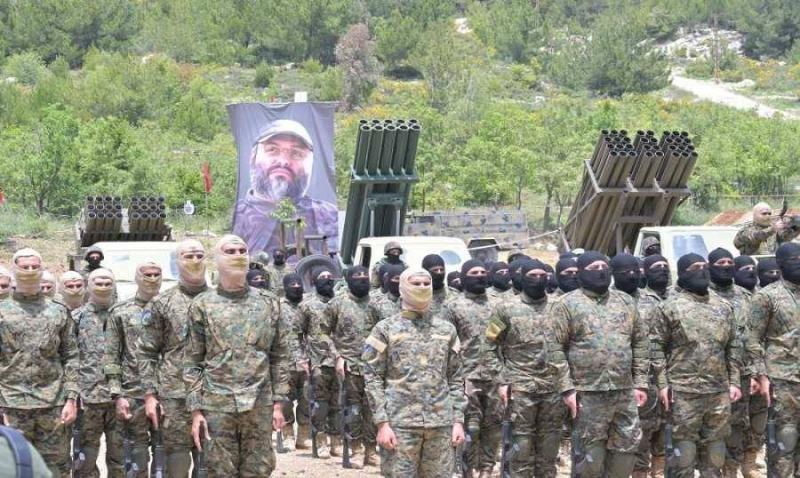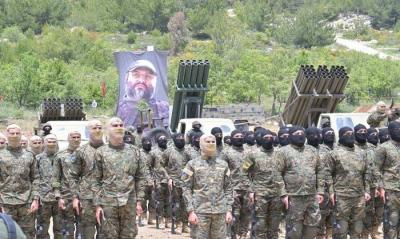In the context of the largest and most intense revenge for the assassination of one of its prominent field leaders, Hezbollah launched massive attacks yesterday targeting Israeli military centers and installations, vowing a strong response to Israel. This critical development in the ongoing confrontations since October 8 has placed all of Lebanon at risk of sliding into a comprehensive conflict. It became evident that, following the assassination of Hezbollah's key field leader Taleb Sami Abdullah, also known as Abu Taleb, and a series of similar assassinations that resulted in the loss of dozens of field elites, Hezbollah aimed with its retaliatory strike yesterday—which involved unprecedented missile and drone attacks on more than nine military centers—to deter Israel from continuing its assassination tactics and to establish a red line against it. This was materially expressed through significant escalation, heightening fears of a broad confrontation that Israel seemed to be preparing for imminently. Concerns even reached the United States, which might explain its preemptive warning against the potential for the situation to spiral out of control and approach a major explosion, an outcome that Washington has been stressing the need to avoid for fear of igniting a widespread regional conflict.
In response to Hezbollah's retaliatory actions, Israel announced that Hezbollah, Iran, and the Lebanese government bear "full responsibility" for the increase in violence along the Israeli-Lebanese border, hinting that escalation may be planned. Israeli government spokesperson David Menzar stated that Lebanon and Hezbollah, directed by Iran, are entirely responsible for the deteriorating security situation in the north. He added: "Through diplomatic efforts or otherwise, Israel will restore security along our northern borders," and during a press conference, he declared that Israel would respond strongly to all attacks carried out by Hezbollah. Israeli public broadcasting reported that the war council, in its new formation, convened overnight to discuss the escalation on the northern border. Recently resigned Israeli minister Benny Gantz indicated in a statement that it appears they might be forced into war with Lebanon, despite his previous assertions that a political solution is preferable for the crisis in the north.
Amid ongoing escalation, a senior U.S. official told Reuters that the United States is highly concerned that combat activities along the Israeli-Lebanese border could escalate into a full-scale war, adding that specific security arrangements are needed for the area, and that a ceasefire in Gaza is insufficient. He remarked: "We have had continuous and urgent discussions at various times with Israel and Lebanon over the past eight months since the crisis began," aiming to prevent it from developing into a full-scale war that could have repercussions elsewhere in the region. The U.S. official reaffirmed that a return to the situation in Lebanon prior to October 6 is neither an acceptable nor feasible option. He continued: "This requires exerting severe pressure on the regime. It will rule out Hezbollah's justification for launching these attacks, and I believe it will pave the way for a diplomatic resolution. He also emphasized that "it is not enough to simply reach a ceasefire. An arrangement must be in place that allows Israelis to return safely to their homes in the north."
Hezbollah announced that in response to the assassination carried out by the Israeli enemy in the town of Joya, the Islamic Resistance launched a joint attack with rockets and drones, targeting six military barracks and sites including the military positions in Zharoura, Kila Base, Yoav Barracks, Katsavia Base, Nafah Base, and the Easy Battalion in Beit Halel. Concurrently, aerial operatives launched an airstrike with multiple waves of attack drones against the David Base (the headquarters of the Northern Command), Mischar Base (the primary intelligence center for the northern area responsible for assassinations), and Katsavia Barracks (the headquarters of the 7th armored brigade of the Golani Division 210), hitting their targets accurately. Israeli media reported that Hezbollah fired approximately 150 rockets and drones at Israel in less than 40 minutes. Sources informed Reuters that "Hezbollah" conducted the largest attack on Israel since the beginning of the war.
A source within Hezbollah told Al Jazeera that the compound attack aims to deter Israel and respond to the assassination of military leader Taleb Abdullah, revealing the Israeli sites targeted, including "the command headquarters for the northern region in the Golan known as (David Base), the Israeli intelligence command center for the northern area responsible for assassinations in Lebanon, and the command headquarters for the 7th armored brigade in the occupied Golan." In the evening, Hezbollah announced once again that it conducted a second aerial attack with a squadron of attack drones against Mischar Base, targeting the remaining intelligence centers within it. Additionally, it launched a second airstrike with another drone squadron against Katsavia Barracks, according to "An-Nahar."




